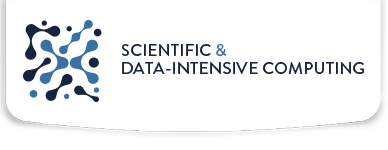Graduates expert in High Performance Computing (HPC) or Simulation-based Science and Engineering (SSE) have excellent job prospects due to the growing demand for their skills in various industries. According to a report by MarketsandMarkets, the global HPC market size is expected to reach $49.4 billion by 2025, with a CAGR of 6.5% during the forecast period. This growth is fueled by the increasing need for efficient computing systems to process vast amounts of data in fields such as finance, healthcare, and weather forecasting.
Similarly, the SSE market is also projected to see significant growth, with a CAGR of 12.8% from 2021 to 2028, according to a report by Grand View Research. The report cites the increasing adoption of simulation tools across industries such as automotive, aerospace, and defense, as well as the growing demand for cloud-based simulation solutions, as key drivers of this growth.
Graduates in HPC or SSE can find employment opportunities in a range of industries, including finance, healthcare, manufacturing, and research and development. With the market for HPC and SSE set to continue growing, graduates in these fields can expect a promising career outlook.
A brief description of SSE and HPC profiles follows.
SIMULATION-BASED SCIENCE AND ENGINEERING EXPERT
The development of digital technologies for data management and intensive computing is driving the growth of Simulation-based Science and Engineering. This field combines in-silico design and analysis with continuous data integration and optimization techniques to create digital twins of product and service life cycles.
Graduates in Scientific and Data-Intensive Computing will be able to work in teams to design complex systems and models within the context of Simulation-based Science and Engineering. They will integrate in-silico design and analysis with continuous data integration and optimization techniques. They will develop problem-solving skills, strong mathematical, computer, and data analytics competencies, and be capable of designing algorithms and integrated systems for simulating and integrating product and service models with data. They will also collaborate in research groups to apply these techniques to frontier problems in the physical and natural sciences.
The Simulation-Based Science and Engineering expert will develop theoretical competencies and practical experience to successfully meet the challenges of the job. They will have solid scientific computing, numerical modeling, optimization, and parallel programming skills. They will be able to communicate effectively with other professionals, understand proposed problems, and communicate their work results in an international context. They will keep themselves updated on technological and methodological innovations and propose innovative and efficient solutions to the proposed problems.
Career prospects for a graduate in this field include working in research and development centers, public or private, that operate in the computational sciences and engineering sector, as well as in computing centers, research and development laboratories, simulation-based engineering, scientific software production companies, and consulting firms.
HIGH PERFORMANCE E DATA-INTENSIVE COMPUTING EXPERT
Graduates in Scientific and Data-Intensive Computing are skilled in using high-performance computing systems and managing large amounts of data. Specifically, they will be experts in creating, managing, and using parallel systems as accelerators for high-performance modeling of digital twins and data analysis.
This professional figure plays an essential role in the evolution of scientific and technological applications of parallel computing. They will be able to analyze real-world problems, integrate different technologies and skills, participate in the modeling and simulation of real systems, and use data analysis.
Graduates will develop a broad spectrum of scientific and technological skills through theoretical and practical experiences, enabling them to successfully face work challenges. These skills include implementing complex system models, such as digital twins, on high-performance computing systems using advanced algorithms, parallel and distributed programming, numerical computation methods, machine learning algorithms, and data management methods.
Graduates will be able to master classic and data-driven modeling techniques, analyze, evaluate, and design high-performance computing systems and software in parallel and distributed computing environments. They will also apply the scientific method to the design, implementation, and evaluation of complex system models.
In addition, graduates will have good communication skills to interact with other professionals, understand proposed problems, and communicate their work results, even in an international context. They will be able to continuously update themselves on technological and methodological innovations and propose innovative and efficient solutions to proposed problems.
Upon completing the Master’s degree in Scientific and Data-Intensive Computing, graduates can pursue careers with high levels of responsibility across a variety of industries. These industries include information processing and computational science and engineering companies/research centers, computing centers, companies and public institutions involved in managing large amounts of data (such as tax agencies, statistical institutes, postal services, and environmental agencies), public and private research and development laboratories, insurance and financial institutions, biomedical and pharmaceutical industries, and consulting firms.
